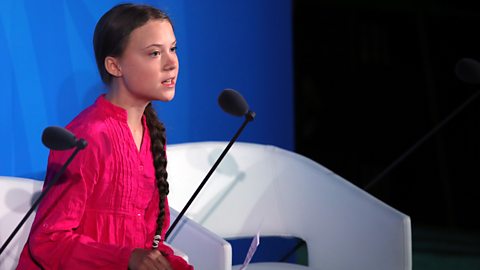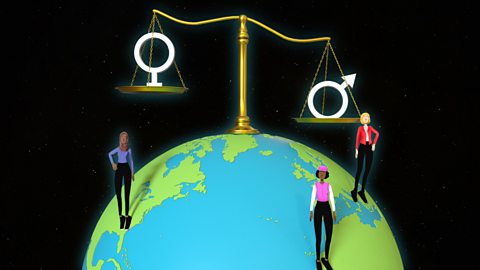The green energy revolution means switching from burning fossil fuels - oil, coal and gas – to producing clean energy from renewable sources.
The effects of climate change
Climate change is a naturally occurring phenomenon that has been happening for millions of years.
We can find evidence of past changes in the climate in:
- the growing and shrinking of ice caps and glaciers
- the fossils of plants and animals that changed as the climate changed
- the concentration of carbon dioxide in air that has been trapped in ice for thousands of years
But recent studies by organisations such as the IPCC (Intergovernmental Panel on Climate Change) suggest that human activity has accelerated the rate of climate change.
Climate change is mainly driven by the greenhouse effectThe trapping of the sun's energy due to gases in the Earths atmosphere. which is caused by some gases in the atmosphere. Human activity has increased the concentration of these gases.
Of these, carbon dioxide (CO₂) produced by human activities is the largest contributor to global warming. Since the beginning of the industrial revolutionA period of time during the 18th and 19th century where the UK shifted to becoming a much more industrial country relying more on machinery and the use of coal and oil. in the 18th century, more and more carbon dioxide has been released into our atmosphere.
Responses to climate change
Analysis by NASA scientists shows that the average global temperature has increased by just over 1°C since 1880. More than half the warming has happened since 1975.
Governments and scientists from across the world are becoming increasingly worried about the impact of climate change as the Earth warms. Some countries are already experiencing wildfires, food shortages and extreme weather events.
Countries are now being urged to reduce their use of fossil fuels and produce more clean energy from renewable sources such as:
- solar cells
- solar heating
- waves
- tides
- hydroelectric power
- geothermal energy
Watch: Green energy revolution video
Watch this short clip to learn more about the green energy revolution.
With the climate crisis becoming more real every day, you may be asking yourself what exactly we can do to fight back. The bad news is that there’s a lot of work to be done. The good news? We’re living through a green energy revolution. And things are being done. On several different levels. Alright, four.
Firstly, there’s the international level. This is the big one. Since 1992, when climate change first began hitting the headlines, the United Nations has encouraged its member states to sign treaties aiming to reduce greenhouse gases and minimise climate change. Some of the UN’s sustainable development goals are tackling the climate crisis head-on, cutting CO₂ emissions, reducing the use of plastic, and making sure that cities and communities are – yes – sustainable. International bodies like the European Union can also set emissions targets. However, it’s up to individual countries to meet them. That’s why so much work is done on a second, national level.
For example, the UK intends to phase out traditional petrol and diesel cars and vans in future, greatly reducing travel emissions. And by 2050, the Welsh government has pledged that emissions will be offset. The vast majority of carbon emissions created here will be cancelled out with things like tree-planting schemes, bringing Wales closer to being a net-zero contributor to global warming.
Thirdly, there’s the local level. Even your local council will have taken notice of climate change, even if they can’t always make the buses run on time. Councils are responsible for recycling schemes. Yes, you may be using five different bins, but the planet thanks you. Honest. Small communities can take matters into their own hands. The Lammas Ecovillage in Pembrokeshire is self-reliant and climate-neutral. In other words, it’s meeting the climate goals set by the government just a few decades ahead of schedule.
Religious groups and communities can also help. The idea that we’re protectors of planet Earth is common to many religions. Groups like Humanists UK are also getting in on the fight against climate change - raising awareness and taking part in climate marches, for entirely non-religious reasons.
And finally, there’s the individual level. That means you. Flying less, eating locally-sourced food, and using public transport can all help in the fight against climate change. But some are going above and beyond the call of duty. Welsh farmers are fighting back. Many are offsetting carbon emissions by making more organic produce, and some are even setting up hydroelectric schemes on their land.
And of course, young people are shouldering more than their share of responsibility. Thanks to climate strikes, and the small things young people do every day, people are starting to talk. And act. On a local level, on a national level, up to the very top. Funny how these things work.
Green energy revolution strategies
There are different strategies for tackling climate change. Many of these require taking a sustainable approach to the way we live our lives.
Being sustainable means being able to meet our own needs without compromising those of future generations, by ensuring that there are enough resources available and that the Earth is kept habitable for the future.
This can be done on four different levels:
- international
- national
- local
- individual
International
Over the years, several international agreements have been drawn up to combat climate change.
The Kyoto Protocol which was agreed in 1997 was a commitment undertaken by 191 countries and the European Union to reduce the amount of greenhouse gases produced, especially carbon dioxide.
It urged developed countries to reduce their CO₂ emissions by more than other countries as they had been the primary contributors in the past. They were also encouraged to invest in new technology.
The Paris Agreement signed in 2016 was the first of its kind in history This deal unites all the world's nations in a single agreement on tackling climate change.
National
In March 2021 Senedd Cymru approved a target of net zeroTo balance the greenhouse gas emissions that are produced with the amount removed from the atmosphere emissions by 2050. This means balancing the greenhouse gas emissions with the amount of gases removed from the atmosphere.
Several goals have been set to achieve this. 43,000 hectares of woodland must be planted by 2030, increasing to 180,000 hectares by 2050. This will play a vital part in removing CO₂ from the atmosphere.
The UK government has decided to ban the sale of new petrol and diesel cars by 2035. They will invest money in charging points for electric cars and fund research into battery technology.
Local
Councils have introduced recycling schemes.
By recycling more, we can reduce the amount of new products that are needed, saving on the energy it would have required to create them.
We can also reduce how much material is sent to landfill sites – decomposing organic materials produce methane which is a potent greenhouse gas.
Examples of sustainable projects include:
- bedZED (Beddington Zero Energy Developments) - a carbon neutral housing complex in Hackbridge, London
- Lammas Ecovillage - a village in Pembrokeshire with nine houses and a community hub which focuses on promoting a sustainable rural lifestyle
Individual
Making small changes to our own lives can also have an impact on climate change. Considering and adapting the foods we eat, the clothes we wear and the ways we travel can reduce the amount of greenhouse emissions produced.
We consume foods from all over the world, such as bananas from Costa Rica and oranges from Spain. By buying more locally grown produce, we can reduce the amount of fossil fuels used to transport food.
Being more conscious about how we travel can also have an impact on reducing greenhouse emissions.
Travelling by car is much more polluting than walking, cycling and using public transport.
Cutting down air travel would also have huge benefits. Researchers estimated that global aviation was responsible for emitting 1.04 billion tonnes of CO₂ in 2018 – which was 2.5 per cent of global CO₂ emissions that year.
Environmental activism
Friends of the Earth Cymru
Friends of the Earth Cymru was established in 1984 with the goal of ensuring a sustainable future for Wales. They campaign on environmental issues and raise awareness of the impacts of climate change in Wales.
Friends of the Earth Cymru’s projects since its establishment include:
- campaigning to stop the building of unnecessary roads, such as a bypass through Snowdonia in the 1990s
- lobbyingInfluencing the decisions of the government on policies and issues. the Welsh Government which led to the setting of annual targets to cut greenhouse gas emissions and introduce an action plan following many recommendations made by them
Greta Thunberg

Many young people are now beginning to take a stand against the systems in place and demanding that countries act on climate change.
The most famous is climate activist Greta Thunberg. She wants governments to act with more urgency in tackling harmful emissions.
Her activism began in 2018 when she was 15 with a protest held outside the Swedish parliament with a sign that read "Skolstrejk för klimatet" ("School strike for climate"). She has inspired young people across the world to hold similar protests.
In 2019 she sailed across the Atlantic Ocean to New York in order to attend the UN climate summit. She did so in a zero-emissions yacht to minimise the carbon footprint of her journey. She wanted to show the impact air travel has on climate change and that "the climate change crisis is a real thing".

More on Revolution
Find out more by working through a topic
- count2 of 3

- count3 of 3
